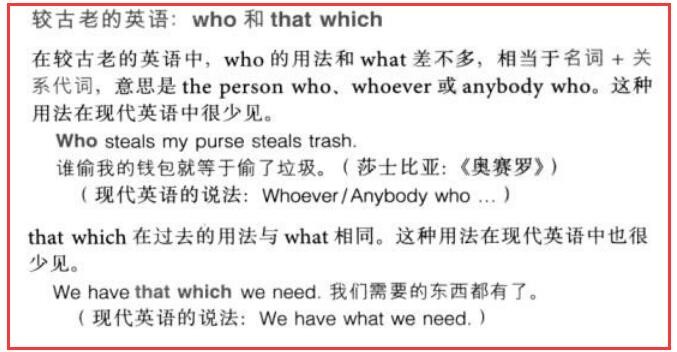好题分享 (11):判断句子正误(what, who)
曾在书上看到这样一句:
I can do what I want and see who I want.
此句应该是正确的。
我们可否模仿此句式写这样一个句子:
I can invite who I find to my birthday party.
这个句子是否正确?
最佳答案 2022-03-09 06:37
I can do what I want and see who I want.
这个句子who作为融合型关系代词引导名词性关系分句之所以仍然见于现代英语,是因为see who I want 是一个所谓自由选择结构(free choice construction),作为融合型关系词,who,which,how在现代英语中只能用于自由选择结构,除此以外把这三个词用来引导名词性关系分句就不符合惯用了。在自由选择结构中,who,which,how被认为是whoever,whichever,however省略了ever。所以这个句子是正确的,因为who在此等于whoever。但在I can invite who I find to my birthday party.这个句子中,在现代英语就会认为这个句子是错误的,因为这不是自由选择结构,who不能引导名词性关系分句,应该把who改为whoever。关于自由选择结构,大家可以阅读剑桥英语语法下面论述(该书P1075):
The free choice
construction (You can do whatever/what you want)
[23] i Invite [whoever/whomever/who/whom you like].
In fused relatives like these the referent of the (overt or understood) subject of the matrix
clause is given the freedom to choose: in [i] it is for you to decide who you invite, and in
[ii] it is for Liz to choose where she goes. We have used ‘free choice’ to label one sense of
any, and constructions with any + integrated relative are very close in meaning to the
above: compare Invite anyone you like and Liz can go anywhere she wants (but see Ch. 5,
§7.14, n. 32, for a slight difference).
There is no detectable difference in meaning between the ·ever and simple forms in
this construction, and since who, which, and how can hardly occur in other kinds of fused
relative, it is plausible to see the ·ever as here omissible by virtue of being redundant: the
“any whatever” meaning is entailed by the free choice and does not have to be explicitly
expressed in the relative word. The verb in this construction belongs to a small class
consisting primarily of choose, like, please, want, wish, and is interpreted as if it had a
clausal complement – e.g. for [ii] “She can go wherever she wants to go”. Note, then, that
Sack who you like does not mean “Sack the persons that you like”, but “Sack whoever
you care to sack”. However, the distinctive syntactic property of the construction – that
of allowing certain simple forms which do not normally occur in fused relatives – is
generally restricted to the case where the clausal complement is merely implicit, so that
we have Invite who you want, but hardly ? Invite who you want to invite. Moreover, please
does not in fact license clausal complements: Go where you please, but not, in Present
day English, ∗ He pleased to go to Paris. And with like the meaning differs aspectually
from that of a construction with an infifinitival complement. I like to take the biggest
portion, for example, implies repeated taking (cf. Ch. 14, §5.6.1), whereas Take which you
like does not. There are also constraints on the matrix clause. For example, the fused
relative must follow the matrix verb: I’ll invite who you like but not ∗ Who you like I’ll
invite.
如果觉得我的回答对您有用,请随意打赏。你的支持将鼓励我继续创作!

其它 1 个回答
谢谢好题老师的好题!
I can invite who I find to my birthday party.
在现代英语中 who 通常不用于引导名词性从句指人,但可以指事。如:
通常不说:I can invite who I find to my birthday party. (可改用whoever)
但可以说:Who will come to my birthday party is not known.
在较早的英语中 who 可以这样用,但在现代英语中已基本不这样用。
请看来自《牛津英语用法指南》的相关说明:

- 5 关注
- 2 收藏,2000 浏览
- 好题 提出于 2022-03-08 20:31
相似问题
-
 《高考英语备考1号·速效编》
《高考英语备考1号·速效编》
-
 《高考英语备考1号·写作编》
《高考英语备考1号·写作编》
-
 《高中英语晨读晚记》
《高中英语晨读晚记》
-
 《高中英语错题笔记》
《高中英语错题笔记》
-
 《零起点考大学英语》
《零起点考大学英语》
-
